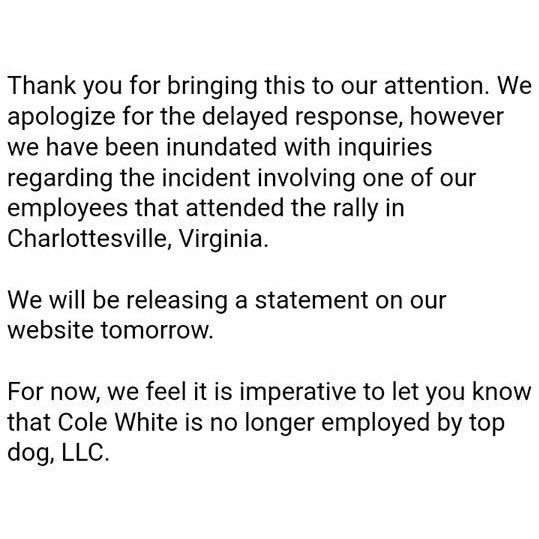In the wake of Friday and Saturday’s horrific, evil events in Charlottesville, the the twitter account YesYoureRacist posted many riot photos and identified many of the rioters. And, as a result, some have lost their jobs.
Question: Does one participating in a Nazi rally enjoy any job protections from said participation?
Answer: Absolutely not.
“But Jon,” you ask, “just six months ago you told us that the National Labor Relations Act protects individuals’ political advocacy during the their own time in non-work areas? What gives?”
What gives is that you missed the key first part of this standard — the political advocacy must be non-disruptive. There was absolutely nothing “non-disruptive” about what happened in Charlottesville. In fact, it was the very definition of disruptive.
Thus, even if Mr. White could argue that the protest was “for or against a specific issue related to a specifically identified employment concern,” (and I would strongly argue that racial purity is not such an issue, see Title VII), the violent and disruptive nature of the protest removes all hope he and anyone else at the rally could hold for any employment protections.
Mr. White absolutely has the constitutional right to hold whatever opinion he wants to hold. And he even has the constitutional right to peacefully express those opinions, no matter how vehemently one might disagree with his point of view. Those rights are what make America great.
Those constitutional rights, however, stop at a private employer’s door. And I, as a private employer, have the right to hold my employees accountable for their viewpoints and terminate when I, in good faith, determine that those viewpoints may bleed into my workplace and create a hostile environment for other employees. I certainly have the right to fire when those viewpoints cross the line into violence or threats of violence.
More deeply, NLRA or no NLRA, free speech or no free speech, if one marches in public exposing a connection to this brand of hate, I would dare the individual to sue after being fired. Do not pass go, do not collect severance, just bring it on.
Because what kind of employer am I if I ignore an employee’s role in what happened over the weekend? What message does it send to my minority employees, my Jewish employees, my Muslim employees, my anyone-but-alt-right employees (not to mention my Title VII obligations to provide a workplace free from racial and religious harassment)?
Silence in the wake of hate at best condones the hate, and at worst participates in it. If it’s my business, I choose not to stay silent.
Jon Hyman is a partner at Meyers, Roman, Friedberg & Lewis in Cleveland. Comment below or email editors@workforce.com.





I don’t disagree with what you said, as far as it goes. Seems to me, though, that not enough is known about the employee’s position. It’s not clear to me that everyone in the march was a believing Nazi or other hater. Some simply believe that our past is our past and lefties have no right to decide what can be remembered and what must be torn up and thrown away. FDR approved of the Japanese detention camps. Must we discard all statutes and other memorabilia of him?
Agreed, Dwayne. A private employer isn’t an authority on who was or wasn’t the aggressor over the weekend. By public record, it appears the General Lee statue removal protest was, in fact, a permitted event (by a Federal Judge) so where does a private employer get off terminating the individual? I’d argue that similar actions and investigations should be made into ALL employees’ extra curricular activities/hobbies or it is targeted at one specific group, which is clearly a violation.
How is it a legal violation to fire a member of a hate group? Please explain. Thank you.
It’s not a legal violation to fire a member of a hate group. It’s not a legal violation to fire someone who is not a member of a hate group. We’ve got you covered already, but one could note that there is no showing here that the employee in question was a member of any group at all.
Then AGAIN one should note Mr. Hyman’s statement (posted twice now) “that it all depends on context and circumstances”.
Are you going to say it’s legal to fire a BLM member as well? or someone who belongs to a group that advocates the death of Law Enforcement Officers?
Nope, but I am going to say that it all depends on context and circumstances.
I’m curious if your position changes with the side on which the violence occurs. If your employee was one of the antifa (anarchists) who assaulted a reporter would you still dismiss him/her?
Absolutely. This is not a left/right issue. It’s a right/wrong issue. Period.
I am sure you would dismiss a BLM member whose group advocates killing police officers. Political correctness and it’s repricusions only seems to apply to the right. #rememberdallas
Well lawyer (I used to be one myself) What do you think of Eugene Volokh’s views on the matter?
https://www.washingtonpost.com/news/volokh-conspiracy/wp/2017/08/16/can-private-employers-fire-employees-for-going-to-a-white-supremacist-rally/?utm_term=.39952202ed0c
My position gels perfectly with the esteemed Professor Volokh. Firing for speech carries more risk than firing for violence. And he is correct that many states’ “off-duty-conduct” laws protect the rights of marchers, but not the rights of those that advocate or participate in violence. There is a huge difference, one that even a staunch free-speech advocate like Mr. Volokh (and he and I are not far off on that opinion) would agree with.
I hope that this applies to all groups, left and right. Nazis and those who destroy private property or attack others voicing their opinion.
It does apply to both sides. But it also all depends on context, circumstances, and conduct.
How do you square this position with firing Communists during the Red Scare and McCarthyite period in US history?
People were fired and blacklisted during the Red Scare based on allegations that they merely associated with alleged Communists. That’s a far cry from Jon’s position that he has “the right to fire when those viewpoints cross the line into violence or threats of violence.”
If one is honest about that position, then one would have to prove that the individual committed violence or made threats of violence. Otherwise, action against them would be just guilt by association and no different from firing Communist.
I don’t know that an employer would have to “prove” anything; an employee alleging wrongful termination would — normally — have the burden of proof. However, I agree that it would be wrong to fire someone simply because they attended, without evidence of what they actually did or said.
A wise employer would have a legally defensible position ready.
Agreed.
This discussion has been entirely too reasonable for the Internet. Must be the effect of the eclipse…
Charlottesville was a wake-up call for a lot of Americans. It’s heartening to see many in the business community stepping up and exhibiting moral leadership against hate speech and actions, which are a cancer in our society.
Great article My Hyman, it was very informative. Thanks for sharing!